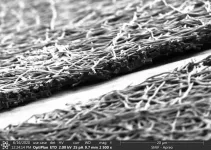(Press-News.org) DALLAS, June 5, 2024 — Nine out of 10 people who suffer cardiac arrest outside of the hospital die, and cardiopulmonary resuscitation (CPR), especially if performed immediately, can double or triple survival rates.[1] That is why the American Heart Association, celebrating 100 years of lifesaving service, will broaden efforts to drive CPR education at the community level through the Heart Walk® campaign. Heart Walk is the Association’s largest community-based activation engaging more than 220 cities nationwide. Through the collective efforts of corporate and community participants, critical funds are raised to advance lifesaving research, increase CPR education and training while promoting equitable health for all people. Recognizing that June 1-7 marks National CPR and Automated External Defibrillator (AED) Awareness Week, the expansion of this lifesaving initiative can empower employers to become champions of CPR.
"At the American Heart Association, we are focused on being a relentless force for a world of longer, healthier lives. Through our Heart Walk initiative, we have a unique opportunity to bring critical awareness and training to communities nationwide." said Marsha Jones, volunteer chairperson of the board of the American Heart Association (2023-2024) and the former executive vice president and chief diversity officer for The PNC Financial Services Group Inc. "Cardiac arrest can happen to anyone at any time and there are countless lives that can be saved if bystanders are equipped to respond effectively. The Heart Walk aims to enhance CPR training accessibility, bolster bystander preparedness, increase funding for vital research, and ultimately, save lives. We encourage every company across the nation to participate in their local Heart Walk and take a significant step towards creating a community of lifesavers."
The year-round Heart Walk campaign engages companies to improve the health and well-being of their employees while driving efforts to fight against cardiovascular disease, the no. 1 killer in the nation. Now, participating companies will not only contribute to the fight against heart disease and stroke but also will help drive the American Heart Association’s Nation of Lifesavers™ movement. The movement represents the Association’s latest investment and commitment to CPR awareness and education. The Association has set a goal to double survival rates from cardiac arrest by 2030.
“We want at least one person in every household to learn CPR,” said said Joseph C. Wu, M.D., Ph.D., FAHA, current volunteer president of the American Heart Association, director of the Stanford Cardiovascular Institute and the Simon H. Stertzer Professor of Medicine and Radiology at Stanford School of Medicine. “Imagine the lifesaving impact we could make if every home had a hero in waiting who was confident and ready to act in a cardiac emergency. By engaging more people in Heart Walk, we can turn our nation of bystanders into a nation of lifesavers.”
For more than six decades, the American Heart Association has led the way as the global leader in resuscitation science, education and training, and as the official publisher of the scientific guidelines for CPR. The multi-year Nation of Lifesavers initiative supports CPR education, extends AED use and engages employers, policymakers, philanthropists and others to increase the chain of survival. The long-term goal is to ensure that in the face of a cardiac emergency, everyone, everywhere is prepared and empowered to perform CPR.
For more information about the Heart Walk and to get your company involved, visit heart.org/heartwalk.
Additional Resources
Spanish News Release (To be added when available)
###
About the American Heart Association
The American Heart Association is a relentless force for a world of longer, healthier lives. We are dedicated to ensuring equitable health in all communities. Through collaboration with numerous organizations, and powered by millions of volunteers, we fund innovative research, advocate for the public’s health and share lifesaving resources. The Dallas-based organization has been a leading source of health information for a century. During 2024 - our Centennial year - we celebrate our rich 100-year history and accomplishments. As we forge ahead into our second century of bold discovery and impact our vision is to advance health and hope for everyone, everywhere. Connect with us on heart.org, Facebook, X or by calling 1-800-AHA-USA1.
[1] Association of Bystander and First‐Responder Efforts and Outcomes According to Sex: Results From the North Carolina
END
Employers coast to coast join movement to turn bystanders into lifesavers
The American Heart Association celebrates CPR and AED Awareness Week by expanding lifesaving efforts through corporate-driven Heart Walk® campaign
2024-06-06
ELSE PRESS RELEASES FROM THIS DATE:
Flavor restrictions affect tobacco buyers differently depending on socioeconomic status, researchers say
2024-06-06
Restricting menthol flavor in cigarettes while making nicotine replacement therapy, such as a skin patch that can help ease withdrawal, more available and affordable has the potential to reduce socioeconomic disparities in tobacco use.
That was one of the findings in a study published in May in Nicotine and Tobacco Research that marks a new use of existing data from the Fralin Biomedical Research Institute at VTC’s Addiction Recovery Research Center. Researchers analyzed data from their Experimental Tobacco ...
Botanists and archaeologists receive National Science Foundation grant to study Mediterranean history
2024-06-06
It’s an unusual collaboration. Botanists and archaeologists don’t often work together, unless they’re studying the way people have used plants through time. But a new four-year grant from the National Science Foundation is shaking things up. It provides more than $1 million to study how Mediterranean plants that people have largely ignored evolved and diversified in one of the most formative periods of human history.
“The Mediterranean is at the crossroads of Europe,” said Nicolas Gauthier, curator ...
Silkworms help grow better organ-like tissues in labs
2024-06-06
DURHAM, N.C. -- Biomedical engineers at Duke University have developed a silk-based, ultrathin membrane that can be used in organ-on-a-chip models to better mimic the natural environment of cells and tissues within the body. When used in a kidney organ-on-a-chip platform, the membrane helped tissues grow to recreate the functionality of both healthy and diseased kidneys.
By allowing the cells to grow closer together, this new membrane helps researchers to better control the growth and function of the key cells and tissues of any organ, enabling them to more accurately model a wide range of diseases and test therapeutics.
The research appears June 4 in the journal Science Advances.
Often ...
Scientists ‘read’ the messages in chemical clues left by coral reef inhabitants
2024-06-06
What species live in this coral reef, and are they healthy? Chemical clues emitted by marine organisms might hold that information. But in underwater environments, invisible compounds create a complex “soup” that is hard for scientists to decipher. Now, researchers in ACS’ Journal of Proteome Research have demonstrated a way to extract and identify these indicator compounds in seawater. They found metabolites previously undetected on reefs, including three that may represent different reef organisms.
Plants and animals living in coral reefs release various substances, from complex macromolecules to individual amino acids, into the surrounding water. To determine ...
Identifying risk factors for native coronary atherosclerosis progression after percutaneous coronary intervention
2024-06-06
https://www.scienceopen.com/hosted-document?doi=10.15212/CVIA.2024.0033
Announcing a new article publication for Cardiovascular Innovations and Applications journal. This study was aimed at investigating factors influencing the progression of native coronary atherosclerosis after percutaneous coronary intervention (PCI).
A cohort of 462 patients was classified into progressive (n = 73) or non-progressive (n = 389) groups according to the presence of native coronary atherosclerosis progression on coronary angiography. ...
Mapping noise to improve quantum measurements
2024-06-06
One of the biggest challenges in quantum technology and quantum sensing is “noise”–seemingly random environmental disturbances that can disrupt the delicate quantum states of qubits, the fundamental units of quantum information. Looking deeper at this issue, JILA Associate Fellow and University of Colorado Boulder Physics Assistant Professor Shuo Sun recently collaborated with Andrés Montoya-Castillo, Assistant Professor of Chemistry, and his team to develop a new method for better understanding and controlling this noise, potentially paving the way for significant advancements in quantum computing, ...
Tiny predator owes its shape-shifting ability to “origami-like” cellular architecture
2024-06-06
For a tiny hunter of the microbial world that relies on extending its neck up to 30 times its body length to release its deadly attack, intricate origami-like cellular geometry is key. This geometry enables the rapid hyperextensibility of the neck-like protrusion, for single-celled predator Lacrymaria olor, a new study reports. The findings not only explain L. olor’s extreme shape-shifting ability but also hold potential for inspiring innovations in soft-matter engineering or the design of robotic systems. Single-celled protists are well known for their ability to perform dynamic morphological changes in ...
Widespread use of high-assay low-enriched uranium raises significant nuclear security concerns
2024-06-06
In a Policy Forum, R. Scott Kemp and colleagues argue that promoting new nuclear reactor technologies using high-assay low-enriched uranium (HALEU) threatens the international system of controls that has prevented nuclear weapons proliferation for over 30 years. “Governments and others promoting the use of HALEU have not carefully considered the potential proliferation and terrorism risks that the wide adoption of this fuel creates,” write Kemp et al. The authors warn that if HALEU becomes a standard reactor ...
JWST uncovers features of very-low-mass star’s protoplanetary disk that influence planet composition
2024-06-06
James Webb Space Telescope (JWST) observations have revealed abundant hydrocarbons in the protoplanetary disk surrounding a young, very-low-mass star – findings that provide novel insights into the chemical environment from which many terrestrial planets, in particular, are born. Planets form in disks of gas and dust that orbit young stars. Observations show that terrestrial planets form more efficiently than gas giant planets around very-low-mass stars (VLMSs) – those with less than 0.3 solar masses. Although the chemical compositions of the inner disk regions around higher mass stars ...
Mammalian adipose tissue thermogenesis evolved in eutherian mammals
2024-06-06
Heat production in fat tissue, a trait also known as adipose tissue thermogenesis, evolved over two stages in mammals, fully developing in eutherian mammals after the group’s evolutionary divergence from marsupials, according to a new study. The results could provide insights that inform future therapies related to metabolism and obesity. Many organisms produce heat internally to regulate body temperature. It is thought that the evolution of the ability to maintain high body temperatures provided ...
LAST 30 PRESS RELEASES:
Molecular glue discovery: large scale instead of lucky strike
Insulin resistance predictor highlights cancer connection
Explaining next-generation solar cells
Slippery ions create a smoother path to blue energy
Magnetic resonance imaging opens the door to better treatments for underdiagnosed atypical Parkinsonisms
National poll finds gaps in community preparedness for teen cardiac emergencies
One strategy to block both drug-resistant bacteria and influenza: new broad-spectrum infection prevention approach validated
Survey: 3 in 4 skip physical therapy homework, stunting progress
College students who spend hours on social media are more likely to be lonely – national US study
Evidence behind intermittent fasting for weight loss fails to match hype
How AI tools like DeepSeek are transforming emotional and mental health care of Chinese youth
Study finds link between sugary drinks and anxiety in young people
Scientists show how to predict world’s deadly scorpion hotspots
ASU researchers to lead AAAS panel on water insecurity in the United States
ASU professor Anne Stone to present at AAAS Conference in Phoenix on ancient origins of modern disease
Proposals for exploring viruses and skin as the next experimental quantum frontiers share US$30,000 science award
ASU researchers showcase scalable tech solutions for older adults living alone with cognitive decline at AAAS 2026
Scientists identify smooth regional trends in fruit fly survival strategies
Antipathy toward snakes? Your parents likely talked you into that at an early age
Sylvester Cancer Tip Sheet for Feb. 2026
Online exposure to medical misinformation concentrated among older adults
Telehealth improves access to genetic services for adult survivors of childhood cancers
Outdated mortality benchmarks risk missing early signs of famine and delay recognizing mass starvation
Newly discovered bacterium converts carbon dioxide into chemicals using electricity
Flipping and reversing mini-proteins could improve disease treatment
Scientists reveal major hidden source of atmospheric nitrogen pollution in fragile lake basin
Biochar emerges as a powerful tool for soil carbon neutrality and climate mitigation
Tiny cell messengers show big promise for safer protein and gene delivery
AMS releases statement regarding the decision to rescind EPA’s 2009 Endangerment Finding
Parents’ alcohol and drug use influences their children’s consumption, research shows
[Press-News.org] Employers coast to coast join movement to turn bystanders into lifesaversThe American Heart Association celebrates CPR and AED Awareness Week by expanding lifesaving efforts through corporate-driven Heart Walk® campaign




